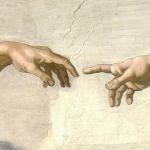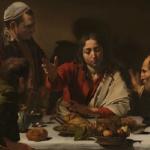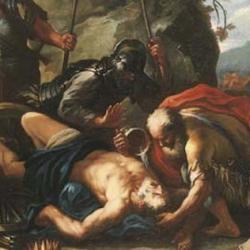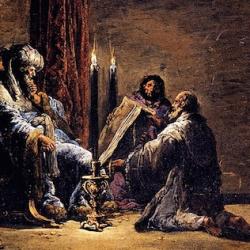When he became king at the age of twelve, Manasseh of Judah “turned,” “built,” “raised” altars, prostrated himself, and engaged in liturgical service (2 Chronicles 33:3). It looks like a promising sequence of actions, what all the good kings of Judah did.
But the quality of Manasseh’s reign turns on the direction of his “turn” (Heb. shuv). The word is often used of repentance, but here it refers to Manasseh’s “repentance” from the ways of his father, Hezekiah. He builds high places that his father had destroyed. He erects altars, but for the worship of Baals and Asherim. He prostrates himself and serves, but his service is devoted to the host of heaven (vv. 2-3).
As always, Manasseh’s idolatry is profoundly self-alienating. Throughout Chronicles, the “hosts” are the hosts of Yahweh. These are sometimes the angelic hosts who surround Yahweh’s throne (2 Chronicles 18:18), but more often they are the “hosts” of Israel’s armies. Israel is, as William Johnstone puts it, the earthly “sacrament” of Yahweh’s heavenly host, Yahweh’s human army. When Manasseh (whose name means “Forgetful”) worships the host of heaven, he not only forgets Yahweh but His own people. Fittingly, he is eventully overcome by a host of Assyrians (v. 11).
2 Chronicles 33:3-5 describe his building projects with ominously increasing specificity: He builds high places (v. 3); he builds altars in the house of Yahweh (v. 4); those altars in the house of the Lord are in the courts, and they are devoted to the “host” of heaven. Yahweh chose Jerusalem for His own city, the place where He set His own name. Manasseh instead “places” images in the place of Yahweh’s name (v. 7).
Manasseh is a man of 6s. Verse 3 describes his activity with six verbs: turn, build, raise up, makes/do, prostrate, serve. “Build” (Heb. banah) is used six times in chapter 33 (33:3, 4, 5, 14, 15, 19). His dalliance with the occult is described with a sixfold list: his son passes through fire; he does ‘anan, nichesh, and kishsheph; he does ‘ov and yid’oniy. (The terms are rare and difficult to distinguish). A man of 6s, perhaps even a 666.
Manasseh’s “turn” and forgetfulness are a danger to Judah. Yahweh chose Jerusalem as a place to set His name, and in setting His name He also set Israel in place. He appointed them (a form of ‘amad, “stand,” give-standing) in the land, and planted their feet there. That not only implies an end to wandering, but also dominion and rule: Kings place enemies and lands “under their feet”; as long as Yahweh is enthroned with the ark as His footstool under His feet, Israel will have dominion over the land. So long as Yahweh sits in Sabbath enthronement, so will Israel.
But their standing in the land is conditional. Israel’s feet will stay put only if they keep His commandments and laws (v. 8). Manasseh does the opposite, putting another god in the very face of Yahweh. And so they are not long for the land.
Verse 2 uses to’evah, “abomination,” rarely used in Chronicles, but used increasingly at the end of 2 Chronicles. It describes the evils of the goyim who were expelled from the land centuries before. Manasseh’s turn turns Israel into another goy, another nation devoted to false gods. Because of his turn, Israel will lose standing, topple, and fall.












